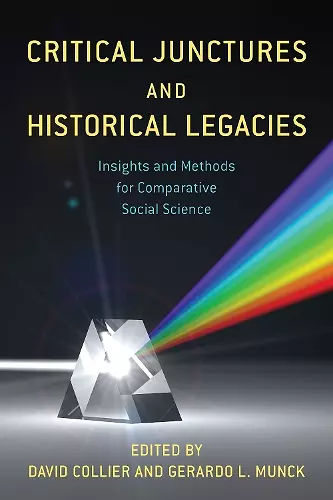Critical Junctures and Historical Legacies
Insights and Methods for Comparative Social Science
Gerardo L Munck editor David Collier editor
Format:Hardback
Publisher:Bloomsbury Publishing PLC
Published:7th Mar '22
Currently unavailable, and unfortunately no date known when it will be back

Over the past 50 years, scholars across the social sciences have employed critical juncture analysis to understand how social orders are created, become entrenched, and change. In this book, leading scholars from several disciplines offer the first coordinated effort to define this field of research, assess its theoretical and methodological foundations, and use a critical assessment of current practices as a basis for guiding its future. Contributors include stars in this field who have written some of the classic works on critical junctures, as well as the rising stars of the next generation who will continue to shape historical comparative analysis for years to come. Critical Junctures and Historical Legacies will be an indispensable resource for social science research methods scholars and students.
The notion of a critical juncture has become a key idea in social science to capture the interaction of structure and agency in ways that open up new intellectual horizons and free us from outdated frameworks. This volume brings together the leading scholars on the topic and will become the standard reference work. -- Daron Acemoglu, Massachusetts Institute of Technology
This book consists of wide-ranging essays on “critical junctures,” rapid, discontinuous transformations of societies which leave a historical legacy partially constraining subsequent actions. Most essays are empirical case studies, but there are also theoretical contributions. Several focus on colonialism’s legacies. The essays are intelligent and well-balanced, ably discussing both the utility and the limitations of the model. I recommend it as an important contribution to macro-sociology. -- Michael Mann, University of California, Los Angeles
The essays in this volume do more than explore definitively the implications (and ambiguities) of the concept of “critical junctures.” They highlight a much neglected generic element in scientific political analysis, namely, the crucial importance of temporality—when something happens and, especially, when it happens relative to something else can be much more significant than either the immediate magnitude or direction of what happens. -- Philippe C. Schmitter, European University Institute
At last, we have the definitive work on critical junctures. Ranging widely across time, continents and methodological issues, this stellar volume considers and advances the many debates about how political systems change, setting new research agendas for the field. With a wide ambit and a distinguished set of contributors, this book will be indispensable reading for all scholars interested in how politics evolves over time. -- Peter Hall, Harvard University
In merging the frameworks of critical junctures with that of historical legacy, this volume provides substantive insights into how we have come to be where we are. A heuristic which allows the scholar to combine structural deterministic accounts with the agency of chance and choice. It represents a much needed alternative to current approaches. -- Miguel Centeno, Princeton University
This shrewdly designed and wonderfully executed collection will invigorate the work of historically-oriented social scientists. The concept of critical junctures has a rich tradition, but the editors and their stellar team of authors bring much-needed clarity to the term. Equally important, they demonstrate how it can be effectively deployed to illuminate matters of the greatest significance. -- Paul Pierson, UC Berkeley
Critical junctures implicitly or explicitly inform much social science research. Collier, Munck, and a top-notch roster of authors, provide the definitive treatment of this vital conceptual, methodological, and substantive tool. Collectively, the volume's contributors convincingly assess what has endured, which refinements and critiques are most compelling, and new directions for the development and application of the critical junctures approach. The book is a must-read for social scientists from diverse disciplines. -- Melani Cammett, Harvard University
Social scientists have a growing interest in historical explanation and in the dramatic events that shape subsequent history, but that research tradition has often suffered from theoretical imprecision and insufficient methodological self-consciousness. Collier and Munck’s volume marks a sharp break, giving historical researchers important new tools to sharpen their arguments. Other equally distinguished scholars have added chapters laying out the full range of methods and controversies in the study of critical junctures. This is a must-have book. -- Christopher H. Achen, Princeton University
Kudos to Collier and Munck. They have assembled a wonderful group of scholars and produced the definitive volume on critical junctures and their historical legacies. The chapters bring terrific insight to current conceptual, methodological, and substantive debates (especially about structure and agency, as well as timing and sequence); they specify systematic procedures for identifying critical junctures and their consequences; and they address substantive questions to illustrate the empirical and theoretical power of this approach. This book will become an indispensable reference for social science theorizing about historical ruptures that generate enduring political change. -- Deborah J. Yashar, Princeton University
“[N]o collection offers a more complete account of this [critical juncture] tradition than David Collier and Gerardo L. Munck’s edited volume, Critical Junctures and Historical Legacies: Insights and Methods for Comparative Social Science. It is a superbly edited book that details the stakes in critical juncture analysis and offers extensive guidance for how it can be used in qualitative historical research. . . . Altogether, this volume is a milestone in critical juncture analysis that will serve as a major resource for seasoned and early career researchers alike. * Perspectives on Politics *
ISBN: 9781538166147
Dimensions: 227mm x 160mm x 32mm
Weight: 848g
496 pages